The opportunity cost of virtue signaling
I was at the grocery store the other day wearing my “Black Lives Matter” pin and a black employee stopped me to remark about how beautiful the pin was, and thanked me for wearing it. I had forgotten I was wearing it, but I was glad to be reminded. The pin was what people know as “virtue signaling.” In an era of Facebook activism, it’s more and more common for people to “signal” their ethics or morality, whether it’s with a pin or a Facebook status update.
There are some good reasons to do this, I think. For many people, the signal itself is an indication of safety when hostility is typically how they are received. For example, a pride flag or a sign welcoming immigrants lets people from the LGBTQIA community and those without papers know that they are safe. Churches, in general, can use these signs for inclusion. Some people think that the famous "Jesus fish," was a sign that Early Christians used to signal safety to each other.
Sometimes virtue signaling can express itself in other political statements, too, concerning peace, justice, inequity, and inequality. These signals don’t just help others feel safe, they help frame dialogue and commonality. They also can teach us. I suppose one could look at our list of proverbs and see some virtue signaling among them. For example, “Fomenting diversity and reconciliation is at the prophetic heart of our gospel.” Or “Generating justice and hope in our neighborhood must be at the heart of us.” Or, “One’s sexual orientation is not a barrier between them and God. The love of Jesus makes no distinctions. We are one in Christ.” I have friends who have found comfort, safety, and conviction in those proverbs. Virtue signaling, if you want to reduce it to that, helped in these cases.
I’m a brown guy, too. My skin color is also something of a virtue signal. I am not sure what to do about it, or if I should think about it, but having a brown guy lead from “up front,” means something to other people of color. Or so I’ve been told. There isn’t much I can or can’t do about it. I wear my skin color all the time. I also happen to wear my passions and convictions, though I can deliver them with more nuance. It's worth noting some people probably decided that they didn't want a brown pastor too.
But there is an opportunity cost to this kind of behavior. Someone was telling me the other night that virtue signaling seeks mainly to confirm and validate like-minded people. It’s “memetic,” meaning it’s a loud message whose purpose is to organize, not convince. So it often lacks nuance and “quietude,” if you will.
Some people might actually be isolated by overt messaging. Sometimes it’s worth offending someone for the sake of including someone else, to be sure. Other times, it’s riskier to do it. It depends if your goal is to message to like-minded folks; like when I first visited a Sunday meeting, it was Circle of Hope’s overt peace messaging that got me to stick around. Another friend of mine joined us because of our anti-fracking team. Of course, if your goal is to help someone join the movement, follow Jesus for the first time, we need to be “all things to all people,” as Paul noted. That means sensitively delivering the truth in love. I think we need to keep telling the truth, but not at the expense of love—and vice versa.
It might be tempting to be totally safe and neutral. We could never make an assertive statement because we’d be afraid we’d offend someone. That sort of blandness has an opportunity cost, as well. One of my friends recently joined us because his previous church was silent about the election and that Trump was elected. Opposition and resistance to one thing doesn’t mean allegiance to another thing, though. Our world is so divided and so binary that someone might think a criticism of the current administration is support for the previous one, or the losing campaign.
For us, in Circle of Hope, one key signal to express is that we are forming the alternative along with those moved by the Holy Spirit around the world. That does not mean we are apolitical—the Gospel is anything but apolitical—but it does mean that we don’t find hope in the powers that be, in the state or the market.
I felt much more hope the other night imagining our future together and how we wanted to transform the region at our Open Mapping meeting than I did the next morning at the sterile voting booth (even if I did give my vote to the most progressive DA in our town’s history).
There is time and a place to message and signal. But we are an incarnational body, so I hope we not only move to have the right words and stances and literature, but that we let our actions do the talking. The message is in our mission, it’s in the medium. We want to disciple a diverse group of people, as diverse as the Kingdom of God. We want to make peace, not just argue for pacifism. We want to be reconcilers, not just make sure we have mastered the language of intersectionality. We want to do justice, not just talk about it.


